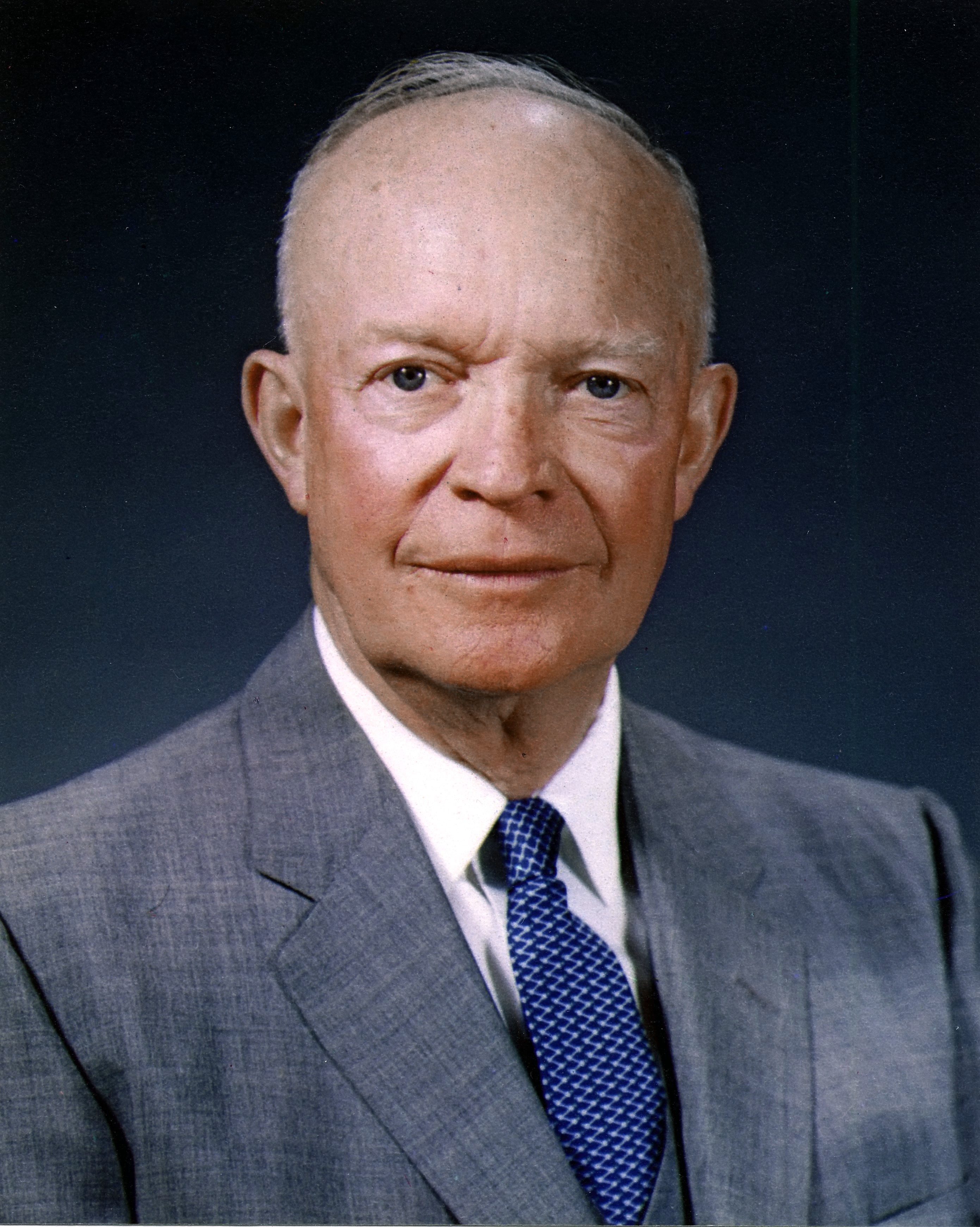Frases célebres de Dwight David Eisenhower
Sin fuentes
Frase pronunciada en el año 1953.
Sin fuentes
Frase pronunciada luego de haber reducido la tasa de mortalidad de Nomandía, esperada en un 70% a un 20%.
Fuente: El libro que dio forma al mundo. Mangalwadi, Vishal. Página 405. Grupo Nelson. 2011.
Dwight David Eisenhower: Frases en inglés
1950s, Address at the Philadelphia Convention Hall (1956)
“Oh, goddammit, we forgot the silent prayer.”
Remark at a cabinet meeting, as quoted in Since 1945 : Politics and Diplomacy in Recent American History (1979) by Robert A. Divine, p. 55
1950s
Response to questions about the investigation of Robert Oppenheimer's supposed Communist sympathies
Public Papers of the Presidents of the United States. Dwight D. Eisenhower (1954), p. 435
Cited in [Brendon, Piers, Ike: His Life & Times, 1st edition, 1986, Harper & Row, New York, ISBN 0-06-015508-6, p. 270 of 478, The Dawn of Tranquility]
1950s
Speech at Williamsburg College http://www.eisenhower.archives.gov/education/bsa/citizenship_merit_badge/eisenhower_citizenship_quotations.pdf (15 May 1953)
1950s
1950s, The Chance for Peace (1953)
Reported in an editorial in the Alton Evening Telegraph (July 14,1964), A-4; appeared in a display ad in the Los Angeles Times (September 27, 1964), D14. Reported as misattributed in Paul F. Boller, Jr., and John George, They Never Said It: A Book of Fake Quotes, Misquotes, & Misleading Attributions (1989), p. 24, stating that an aide of Eisenhower's had denied that Eisenhower had made the remark.
Misattributed
Remarks to the National Society of the Daughters of the American Revolution http://www.eisenhower.archives.gov/education/bsa/citizenship_merit_badge/eisenhower_citizenship_quotations.pdf (22 April 1954)
1950s
“The chief of staff says I'm the guy.”
Journal entry after being informed by George Marshall that he would be in command of Operation Overlord, as quoted in Eisenhower : A Soldier's Life (2003) by Carlo D'Este, p. 307
1940s
Address at the Hollywood Bowl http://www.eisenhower.archives.gov/all_about_ike/quotes.html (19 October 1956)
1950s
1950s, Atoms for Peace (1953)
“The Founders conceived government as the servant, not the master of the individual.”
Remarks to the Los Angeles Chamber of Commerce http://www.eisenhower.archives.gov/education/bsa/citizenship_merit_badge/speeches/address_convention_hall.pdf (31 January 1962)
1960s
“The government in Washington belongs to you.”
Remarks to the National Industrial Conference Board http://www.eisenhower.archives.gov/education/bsa/citizenship_merit_badge/speeches/address_convention_hall.pdf (20 May 1965)
1960s
Presidential news conference http://www.eisenhower.archives.gov/all_about_ike/quotes.html (13 May 1959)
1950s
1950s, The Chance for Peace (1953)
As quoted in Strategies of Containment : A Critical Appraisal of Post-war American National Security Policy (1982) by John Lewis Gaddis
1960s
State of the Union Address to Congress http://www.eisenhower.archives.gov/avwebsite/PDF/54text.pdf (7 January 1954)
1950s
Address at Norwich University http://www.eisenhower.archives.gov/education/bsa/citizenship_merit_badge/eisenhower_citizenship_quotations.pdf, Northfield, Vermont (9 June 1946)
1940s
Columbia University Inaugural Address http://www.eisenhower.archives.gov/education/bsa/citizenship_merit_badge/eisenhower_citizenship_quotations.pdf (12 October 1948)
1940s
Televised statement upon the assassination of President John F. Kennedy https://www.youtube.com/watch?v=KyGzVQGgdqw, (22 November 1963)
1960s
“The proudest human that walks the earth is a free American citizen.”
Talk at the Commercial Club of Chicago http://www.eisenhower.archives.gov/education/bsa/citizenship_merit_badge/eisenhower_citizenship_quotations.pdf (21 May 1948)
1940s
Address at the Centennial Celebration Banquet of the National Education Association http://www.eisenhower.archives.gov/all_about_ike/quotes.html (4 April 1957)
1950s
1950s, Address at the Philadelphia Convention Hall (1956)
1950s, Address at the Philadelphia Convention Hall (1956)
“The hand of the aggressor is stayed by strength — and strength alone.”
A speech at an English Speaking Union Dinner (3 July 1951). It is currently on display on the wall of Eisenhower Hall at the USMA at West Point in New York. Eisenhower Memorial Commission http://www.eisenhowermemorial.org/speeches/19510703%20English%20Speaking%20Union%20Dinner.htm
1950s
In 1957, as quoted in No Use: Nuclear Weapons and U.S. National Security https://books.google.com/books?id=Y_klAgAAQBAJ&pg=PA91&lpg=PA91&dq=%22there+aren%27t+enough+bulldozers+to+scrape+the+bodies+off+the+streets%22&source=bl&ots=g2f8x1zwaq&sig=JxpjSjWSWqsTKHpxnfAjjmW2ibU&hl=en&sa=X&ved=0CCoQ6AEwAmoVChMI6cCQsa6SxgIVAWitCh3TUwty#v=onepage&q=%22there%20aren't%20enough%20bulldozers%20to%20scrape%20the%20bodies%20off%20the%20streets%22&f=false, by Thomas M. Nichols.
1950s
Remarks to American Field Service Students http://www.eisenhower.archives.gov/education/bsa/citizenship_merit_badge/speeches/address_convention_hall.pdf (15 July 1958)
1950s
“It is only as we govern ourselves that we are well-governed.”
1950s, Remarks on the Observation of Law Day (1958)
1950s, Remarks at the United Negro College Fund luncheon (1953)
1950s, Address at the Philadelphia Convention Hall (1956)
